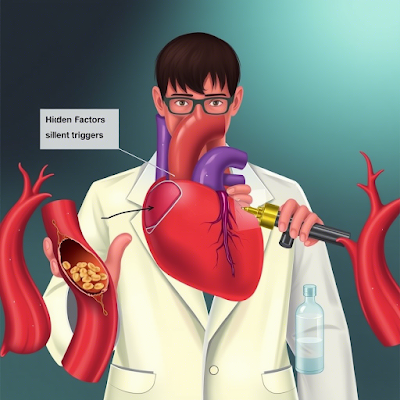Silent Saboteurs: Unmasking the Root Causes of Ischemic Heart Disease
Ischemic heart disease (IHD) sneaks up like a thief in the night, robbing millions of healthy years by restricting blood flow to the heart. Often dubbed coronary artery disease, it’s a global killer fueled by more than just greasy fries. What’s really pulling the strings behind this condition? Let’s peel back the layers with the latest science, expert voices, and some eye-opening resources to guide you.
The Hidden Drivers of IHD
While plaque-clogged arteries remain the hallmark of IHD, the culprits behind the scenes are evolving. Here’s what’s new in the spotlight:
- Inflammation: The Quiet Instigator
Forget cholesterol as the lone bad guy. A 2024 Nature Reviews Cardiology study highlights chronic inflammation as a co-conspirator. Cytokines—tiny proteins unleashed by stress, poor diet, or infections—turn arteries into sticky traps for plaque. Experts now say measuring inflammation (via blood tests for IL-6 or hs-CRP) could predict IHD better than cholesterol alone. - The Sugar-Heart Connection
Diabetes isn’t just about blood sugar—it’s a heart wrecker. The American Diabetes Association reports that high glucose levels damage blood vessels over time, doubling IHD risk. A surprising twist? Even prediabetes, affecting 1 in 3 adults, quietly sets the stage, per a 2025 Circulation study. - Mental Health’s Dark Role
Your mind and heart are more linked than you think. Dr. Sadiya Khan, a Northwestern University cardiologist, told NPR in 2025: “Depression and anxiety don’t just break your spirit—they inflame your arteries.” A JAMA Cardiology analysis found that people with untreated mental health issues face a 40% higher IHD risk. Check out the full story at NPR’s Health Section. - The Viral Link
Could a past infection haunt your heart? Research from The Lancet (2024) suggests viruses like cytomegalovirus (CMV) might linger in artery walls, sparking inflammation and plaque. It’s a slow burn that’s rewriting how we see IHD’s origins.
Expert Voices Weigh In
Dr. Deepak Bhatt, executive director of interventional cardiovascular programs at Brigham and Women’s Hospital, offers a sharp take: “We’ve obsessed over lipids, but the future of IHD prevention is tackling inflammation and lifestyle head-on.” His research, featured on Harvard Medical School’s Site, is a treasure trove for understanding this shift.
Then there’s Dr. Michelle Albert, past president of the American Heart Association, who flags social determinants as game-changers. In a 2025 AHA Journal piece, she notes, “Poverty, racism, and lack of healthcare access amplify IHD risk—biology isn’t the only battlefield.” Her work is a wake-up call for systemic change.
Fresh Angles to Ponder
- Noise Pollution: A 2024 European Heart Journal study ties chronic noise (think highways or airports) to a 10% bump in IHD risk via stress-induced artery damage. Silence might be golden for your heart.
- Vitamin D Deficiency: Low levels could weaken your heart’s defenses. A Journal of Clinical Endocrinology & Metabolism report (2025) links it to higher IHD rates, especially in northern climates.
Top Resources to Explore
The Bottom Line
Ischemic heart disease isn’t a one-trick pony—it’s a symphony of inflammation, mental strain, sneaky viruses, and even the air you breathe. Lean on insights from Bhatt and Albert, dig into the links above, and take charge of your heart’s story. Knowledge isn’t just power—it’s prevention.





Comments